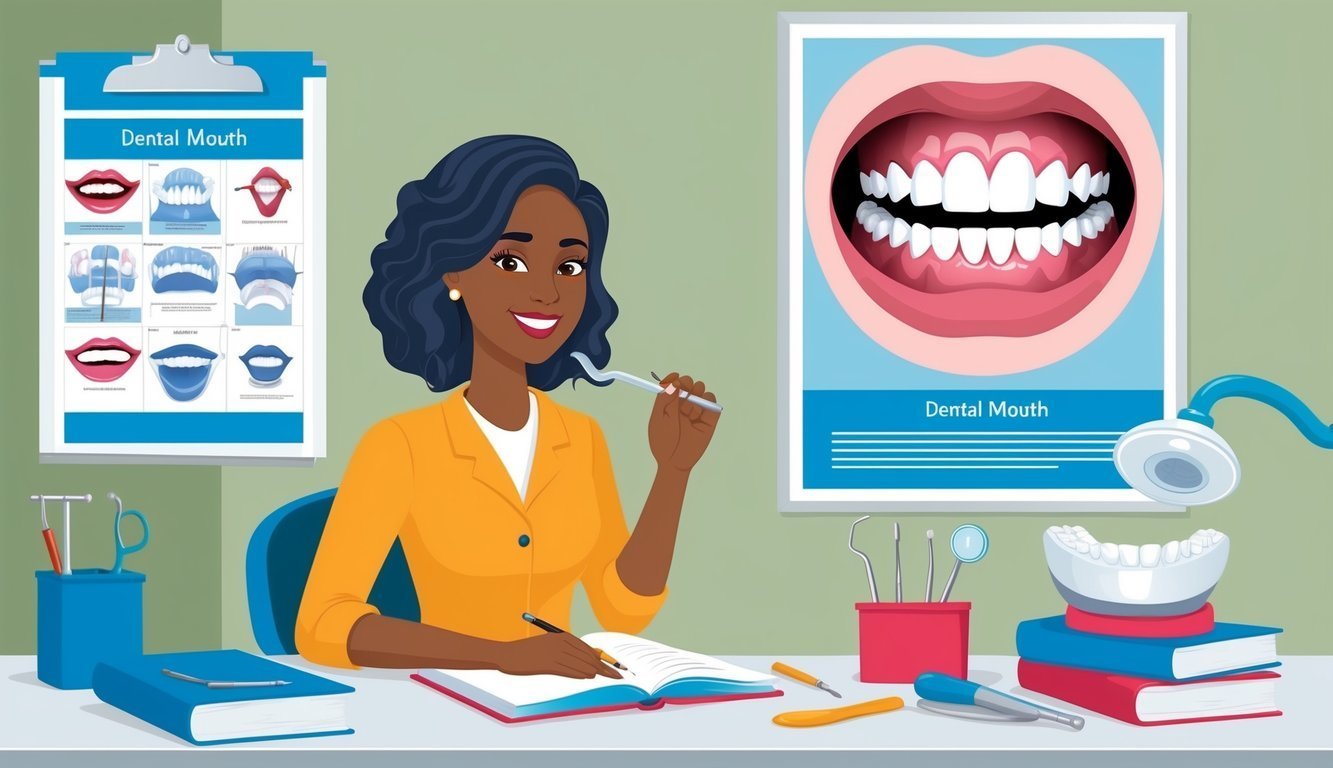Choosing a career as a dental hygienist can be rewarding, offering opportunities to impact patients’ oral health positively. Becoming a dental hygienist typically takes between two to four years, depending on the program you choose. This period includes classroom instruction and hands-on clinical training, equipping you with the necessary skills to excel in the field.
Many aspiring dental hygienists pursue an associate degree in dental hygiene, which typically takes around three years to complete.
Through your studies, you will cover essential topics such as dental anatomy, ethics, radiography, and patient care.
Graduating from an accredited program is crucial, as it prepares you for the required licensure exams you must pass to practice in your state.
With a growing demand for dental hygienists, understanding the educational timeline is vital for your planning.
Pursuing this career not only enhances your professional prospects but also allows you to play a crucial role in promoting better oral health for your patients.
For more detailed steps on how to become a dental hygienist, refer to resources like BestColleges and Forbes.
Educational Path for Dental Hygienists
To become a dental hygienist, you must navigate various educational paths that include different degrees and accredited programs.
Understanding these options will help you make informed decisions about your career.
Degree Options
The typical entry point for a dental hygienist is an associate degree in dental hygiene, which usually takes about two years to complete.
This degree is offered at community colleges and some universities, providing the necessary coursework and clinical experience required for licensure.
For those seeking advancement, a bachelor’s degree in dental hygiene is often pursued.
This degree may take an additional two years and can open doors to roles in education, management, or clinical practice.
Some universities offer accelerated programs for those who already have an associate degree.
Additionally, a master’s degree is available for those who wish to specialize or move into administrative roles.
These advanced degrees typically take two years and may focus on topics such as public health or dental education.
Accredited Dental Hygiene Programs
Selecting an accredited dental hygiene program is essential for your education and future licensure.
Programs accredited by the Commission on Dental Accreditation (CODA) ensure that you receive quality training.
You can find recognized programs at various institutions, including community colleges and universities.
A list of accredited programs can be located on the CODA website.
When evaluating programs, consider factors like clinical opportunities, faculty qualifications, and program outcomes.
Before enrollment, verify that the program meets all state requirements for licensure.
Completing a CODA-accredited program will be critical as it is often a prerequisite for taking the licensing exams and entering the workforce as a skilled dental hygienist.
Licensing and Examinations

To practice as a dental hygienist, you must complete specific licensing requirements, including passing the necessary examinations.
These qualifications ensure that you are prepared to deliver safe and effective dental care.
National Board Dental Hygiene Examination
The National Board Dental Hygiene Examination (NBDHE) is a crucial step in your path to becoming a licensed dental hygienist.
Administered by the Joint Commission on National Dental Examinations (JCNDE), this national exam tests your theoretical knowledge and understanding of dental hygiene.
You must pass this written examination before obtaining your state license.
The NBDHE includes topics like:
- Clinical Hygiene: Techniques and procedures.
- Patient Management: Communication and behavioral skills.
- Dental Materials: Understanding materials used in treatments.
For more information about the NBDHE, visit the official website.
State Licensure and Clinical Exam Requirements
After successfully passing the NBDHE, you must meet your specific state licensure requirements.
Each state has its regulations managed by a state dental board.
Most states require you to take a clinical board examination to evaluate your hands-on skills.
The clinical exam typically involves:
- Patient Assessments: Performing dental cleanings and treatments.
- Radiography: Taking and interpreting dental X-rays.
In addition to passing the clinical exam, you may need to submit proof of your education and pass a jurisprudence exam on dental laws.
Understanding these varying requirements ensures you are well-prepared for your career as a dental hygienist.
Core Skills and Coursework

Successful dental hygienists combine practical skills with theoretical knowledge, both of which are critical for effective patient care.
The coursework undertaken during your dental hygiene program equips you with the necessary competencies to excel in the field.
Clinical Skills and Patient Care
In your training, you will engage in various hands-on practices to develop essential clinical skills.
These include:
- Cleanings: You will learn to perform dental cleanings using specialized tools and techniques.
- Sealant Placement: This technique prevents cavities by applying a protective coating on the teeth.
- Local Anesthetic Delivery: Understanding how to administer anesthetics safely is crucial for patient comfort.
Additionally, you will complete required patient care hours where you apply these skills in real-world settings.
This practical experience is invaluable, as it enhances your confidence and enables you to understand patient needs better.
Theoretical Knowledge
Your coursework will encompass a range of subjects, including:
- Microbiology: Study the microorganisms that affect oral health.
- Dental Anatomy: Gain an understanding of tooth structure and function.
- Oral Pathology: Learn to identify various oral diseases.
Courses in physiology will also provide insight into how systemic health affects oral conditions, while dental radiography will teach you the principles of taking and interpreting X-rays.
These theoretical foundations are essential for diagnosing and treating dental issues effectively, ensuring you are well-prepared for your duties as a dental hygienist.
Career and Continuing Education
As a dental hygienist, you will have opportunities for professional development and specialization throughout your career.
Continuous education plays a crucial role in maintaining your licensure and enhancing your expertise.
Professional Development
To excel in your career as a registered dental hygienist (RDH), engaging in continuing education is essential.
Most states require dental hygienists to complete a certain number of continuing education hours to maintain licensure.
This education not only meets regulatory requirements but also keeps you updated on industry advancements.
Consider the following continuing education opportunities:
| Type of Education | Description |
|---|---|
| Workshops | Hands-on training sessions on specific skills |
| Webinars | Online courses covering various topics |
| Conferences | Networking opportunities with industry experts |
These programs often focus on areas such as periodontology and oral cancer screenings, which can enhance your job performance and open doors to advanced roles in the field.
Specializations and Advanced Practices
You may choose to specialize in various areas to advance your career as a dental hygienist.
Some popular specializations include:
- Public Health Hygiene: Focus on community dental health and preventive care.
- Periodontology: Concentrate on the prevention and treatment of gum diseases.
Pursuing advanced education, such as a Bachelor’s or Master’s degree in Dental Hygiene, can also lead to higher-level positions, including teaching or administrative roles.
Many dental hygiene programs offer specialized tracks, allowing you to tailor your education based on your career goals.
Specialization can boost your job prospects and contribute to the growing demand for skilled dental hygienists.
Career Outlook and Financial Considerations
Understanding the career outlook and financial aspects of being a dental hygienist is crucial for your planning.
This section focuses on earning potential and the demand for dental hygienists in the industry.
Earning Potential
As a dental hygienist, your earning potential can be quite favorable.
The median annual wage for dental hygienists is approximately $77,810.
This figure reflects a higher salary compared to many other occupations in healthcare.
Factors that influence your salary include:
- Location: Salaries can vary significantly based on state and local demand.
- Experience: Entry-level positions typically start lower, but experience can lead to higher wages.
- Type of Employment: Working in private practices generally offers higher pay than positions in public health.
By ~2024, the salary range for dental hygienists typically spans from about $54,000 to $100,000, depending on your specific circumstances.
Industry Demand and Opportunities
The demand for dental hygienists is robust.
The U.S. Bureau of Labor Statistics projects a growth rate of 9% in employment for dental hygienists from 2023 to 2033.
Key factors contributing to this demand include:
- Aging Population: An increase in older adults who require dental care.
- Focus on Preventive Care: A shift toward preventive dentistry, where hygienists play a vital role.
You can expect about 16,400 job openings each year as professionals retire or transition into different careers.
This landscape suggests a healthy job market, making it a favorable time to pursue your career as a dental hygienist.
For more information, you can refer to the U.S. Bureau of Labor Statistics for detailed insights.

